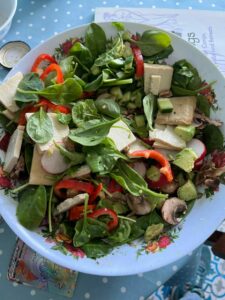Right after polishing off a plate of veg, bean, and potato salad, I realized something interesting: I was inspired to make these very simple dishes after spending last night gushing over Rich Roll and Julie Piatt’s The Plantpower Way. Is it just me, or have vegan cookbooks massively improved in production, photography, and design recently?
Fancy cookbooks are all over the place; our local cookbook store, Omnivore Books, has tons of gorgeous exemplars. But I think that in vegan cuisine this trend is a conscious effort to counter an opinion that may still prevail among some meat eaters–namely, that veganism is ascetic, joyless and prohibitive, and that we don’t enjoy our food. Which is why I’m noticing beautifully-photographed and conceptualized books devoted to the pleasures of veganism.
The Plantpower Way is a classic example. It’s essentially a coffee-table cookbook full of pictures of Rich Roll, the lawyer-turned-ultra-athlete, and his very good looking family (gorgeous yogini wife and four exceedingly handsome teenagers.) The book is so saturated with images of these folks’ beautiful house, great clothes, and fantastic food, that it gave me the uncomfortable feeling that these folks’ happy family life is a sex scandal waiting to happen. 🙂 If you have a cynical bone in your body, you have to ask yourself whether these folks are always as happy and brimming with vitality as they are in the photos (and whether collaborating with their teenagers on such a nutritious diet is always successful). But if you are willing to suspend your disbelief a bit and engage in the fantasy lifestyle of the Rich and Famous, these folks are the poster children for happy, healthy vegans. The recipes are also pretty great, and despite the elaborate photographic appeal not all that cumbersome, if you have a good blender and food processor. The text is all about optimizing nutrition, throwing greens in whenever possible, and other principles–occasionally it veers into not-uncommon hooey about “food vibrations”–but the recipes themselves seem very tasty. Even though the book admonishes us to make our blends (smoothies) more about vegetables than fruit, and to eschew the nut milks, the recipes themselves don’t feel masochistically healthy, have a healthy share of fruit and other yummy ingredients, and there’s a whole chapter on latte coffees and teas that features abundant nut milks. I should mention that these folks have a mysterious aversion to onions and garlic, presumably to make their meals more palatable to kids, but I grew up eating tons of onions and garlic in the Middle East as a kid and am surrounded by children who love both. But what do I know? Your pleasure in this book depends on how fantasy-prone you are, or on how much you’re willing to “live with your imperfections” (as these perfect folks instruct us) and enjoy the recipes without turning green with envy at the time and resources that make this diet possible.
The Plantpower Way is not the first exemplar of this trend, of course. One of the first cookbooks I bought last year was Pure Vegan, which does not feature fancy characters but does have luxurious, hedonistic recipes. The sweets and desserts section is particularly marvelous, and I’ve made the olive oil and pistachio cake from this book with great success (even neater if you bake it in a bundt pan!). On the health-hedonism spectrum, I’d say this book falls toward the latter end. Some of the recipes are elaborate and involved, but some only seem so because of the gorgeous photography. There’s not a ton of information here, but it is certainly an inspiringly beautiful book that I like to leaf through when I plan a party or something of that ilk.
Then, of course, there’s The Oh She Glows Cookbook, which evolved from the famously beloved blog of the same name. As with the Plantpower Way, the book features beautiful people living in a beautiful home, exquisitely photographed cooking and enjoying beautiful food (according to the blog, there’s now a baby in the mix, also!). This one also promises to be fairly hedonistic, and there’s a good mix between elaborate and simple recipes. There are also some practical make-ahead solutions, which are far less fancy-schmancy in terms of preparation than the excellent photography would suggest. And again, the sweets and desserts section is interesting and useful, at least to those of us that still indulge in added sugars once in a while.
Finally, no round-up of fantasy vegan publications is complete without Alicia Silverstone’s The Kind Diet and her lifestyle blog, The Kind Life. This book is an intro to veganism, full of thoughts from Silverstone, who talks about being a celebrity invested in a cause that is near and dear to her heart. There are some photos (beautiful people, beautiful home, beautiful food…) but the recipes are not a big part of it. It’s more of an introductory text for folks for whom Silverstone might open the door to compassionate eating and living. The website is full of sweets, baked goods, and hedonistic recreations of non-vegan foods–made with healthy ingredients and sometimes credited to other vegan cooks. A nice transition, perhaps, for new vegans.
I enjoy these books mostly as visual inspiration, but I find the humorous and down-to-earth work of Isa Chandra Moskowitz, and the practicality and pioneering inventiveness of Miyoko Schinner, more useful on an everyday basis. And, of course, my beloved classic by Phyllis Glazer is at this point the foundation of my cooking style. I’m probably going to continue inventing my own recipes, but looking at the pretty photos for inspiration and presentation.







No comment yet, add your voice below!